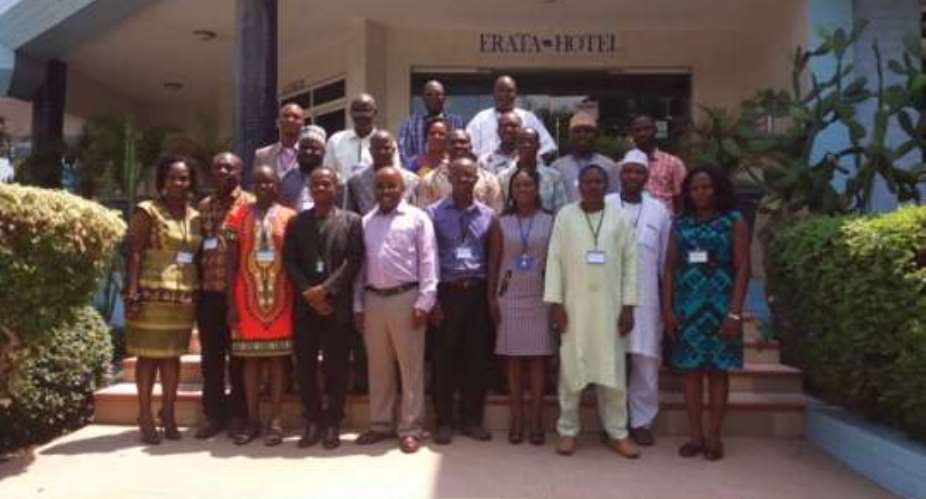By Iddi Yire, GNA
Accra, Oct. 24, GNA - The West Africa Centre for Crop Improvement (WACCI), University of Ghana has held a workshop on Demand Led Variety Design (DLVD) for plant breeders in Africa.
The two-day workshop was based on a training manual developed through a collaboration between the Syngenta Foundation for Sustainable Agriculture (SFSA), the Crawford Fund and the University of Queensland and other partners including WACCI, African Centre for Crop Improvement (ACCI), BecA-ILRI Hub, CIAT, and the University of Nairobi.
The objective of the workshop was to impart skills to plant breeders on how to engage stakeholders in the process of plant variety design with the ultimate aim to improve variety adoption in African agriculture.
Topics covered included: principles of DLVD concept; visioning and foresight for setting breeding goals; understanding clients; and new variety design and product profiling.
Others are variety development strategy and stage plan; monitoring, evaluation and learning; and making use of investments in new variety development.
A total of 20 participants attended the training workshop all from the first three cohorts of WACCI graduates representing National Agricultural Research Systems of Ghana, Nigeria, Niger, Mali, Burkina Faso, Cameroon and Kenya.
Evaluation of the course by participants was very positive and all were willing to be involved in the training of other breeders and relevant stakeholders when the training manual on the demand led variety design is finally rolled out.
Professor Pangirayi Tongoona and Dr Agyemang Danquah delivered the training course.
Participants at the workshop in an interview with the Ghana News Agency hailed WACCI for enhancing their research capacities.
Dr Moses Adedu Adebayo, a Senior Lecturer and maize breeder at the Department of Crop Production and Soil, Ladoke Akintola University of Technology, Ogbomosho, Oyo State, Nigeria, appealed to the Centre to incorporate the modules of the workshop into its PhD programme for training new plant breeders.
He said modern breeder must be well bred to meet the challenges of crop breeding.
Dr Maxwell Darko Asante, a Senior Research Scientist and a Rice Breeder, Centre for Scientific and Industrial Research - Crop Research Institute- Kumasi, said the knowledge gained at the workshop would empower them to produce new varieties that are acceptable to stakeholders and this would go a long way to impact positively on Ghana and Africa at large.
WACCI was established in 2007 with initial funding from the Alliance for a Green Revolution in Africa (AGRA) as a semi-autonomous institute in the UG to train plant breeders at the PhD level for the West African Region.
The establishment of WACCI was inspired by the need to train new scientists required to develop high yielding varieties of indigenous crops adapted to the different agro ecologies in West Africa.
In 2009 WACCI received a grant from AGRA to establish a model maize breeding program for the training of students in field oriented plant breeding techniques for West and Central Africa.
In 2015 WACCI received additional funding from the Scaling Seeds and Technologies Partnership (SSTP)-AGRA to further evaluate and release identified promising varieties.
GNA





 We’ll protect state wealth from opaque deals – Prof Jane Naana
We’ll protect state wealth from opaque deals – Prof Jane Naana
 Mauritania president says running for second term in June polls
Mauritania president says running for second term in June polls
 I won't ever say I was a mere driver’s mate' — Prof. Opoku-Agyemang
I won't ever say I was a mere driver’s mate' — Prof. Opoku-Agyemang
 2024 polls: 'EC struggling to defend credibility'— Prof. Opoku-Agyemang
2024 polls: 'EC struggling to defend credibility'— Prof. Opoku-Agyemang
 Akufo-Addo gov't's 'greed, unbridled arrogance, unrestrained impunity, sheer dis...
Akufo-Addo gov't's 'greed, unbridled arrogance, unrestrained impunity, sheer dis...
 Election 2024: Ghana needs an urgent reset, a leadership that is inspiring – Ma...
Election 2024: Ghana needs an urgent reset, a leadership that is inspiring – Ma...
 Partner NDC to rollout a future of limitless prospects – Prof Jane Naana Opoku-A...
Partner NDC to rollout a future of limitless prospects – Prof Jane Naana Opoku-A...
 NPP will remain in gov’t till Jesus comes — Diana Asamoah
NPP will remain in gov’t till Jesus comes — Diana Asamoah
 Sunyani Technical University demands apology from former SRC president over sex-...
Sunyani Technical University demands apology from former SRC president over sex-...
 'Dumsor' was resolved by Mahama but ‘incompetent' Akufo-Addo has destroyed the g...
'Dumsor' was resolved by Mahama but ‘incompetent' Akufo-Addo has destroyed the g...
